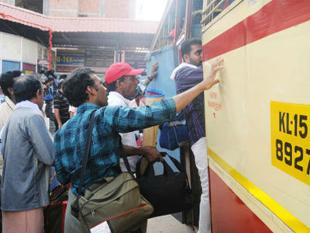 Thiruvananthapuram, Sep 4: The dawn-to-dusk strike called by motor workers' unions in Kerala on Wednesday demanding rollback of the recent hike in fuel prices evoked partial response across the state.
Thiruvananthapuram, Sep 4: The dawn-to-dusk strike called by motor workers' unions in Kerala on Wednesday demanding rollback of the recent hike in fuel prices evoked partial response across the state.
Initial reports from different centres said private buses, trucks, taxis and autos are largely keeping off the roads in most places, affecting the mobility of people. The unions in the state-run KSRTC have not joined the strike and it maintained services as usual. Private vehicles are plying without any hitch.
Police said no violence had been reported from anywhere. University examinations scheduled for the day have been postponed in view of the strike. Essential services like ambulances, milk supply and media have been exempted from the strike. The strike was called by the joint council of motor sector unions which included those affiliated to pro-left CITU and AITUC and pro-Congress INTUC.





Comments
Add new comment